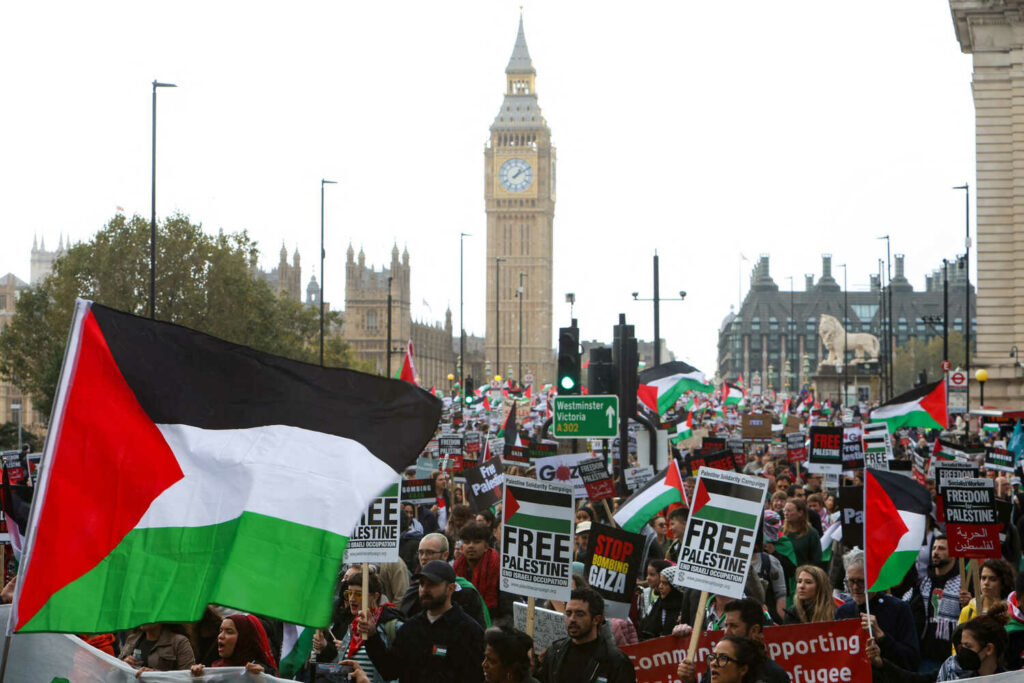
- While the Conservative government has sought to strengthen relations with Israel, there remains a conspicuous disjunction in public sentiment.
- A recent parliamentary vote laid bare this disparity, with only 13 per cent of MPs supporting a ceasefire, despite a resounding 76 per cent of the British public favouring such a measure.
- The overall direction of Western nations, including the UK, raises concerns about the enduring suffering in Gaza amid the persisting conflict.
In recent times, the United Kingdom has borne witness to a notable surge in civic activism, encompassing a spectrum of events from gatherings and demonstrations at various locations to protests staged at factories and academic institutions. This wave of engagement has been galvanized by the unfolding events in Gaza, catalysing a collective call to action and resonating with individuals across the country.
Over the course of the weekend, the UK played host to one of its largest protests to date, drawing together a coalition of hundreds of thousands of demonstrators who passionately advocated for a ceasefire in response to the deepening humanitarian crisis in Gaza. The United Nations Office for the Coordination of Humanitarian Affairs painted a harrowing picture, describing the situation in the North of Gaza as comparable to “hell on earth.” Reports have surfaced indicating non-functional hospitals, and the staggering death toll, now exceeding 11,180, includes a heartbreaking 4,609 children, all within a span of just over a month.
The political landscape became further charged with the controversy surrounding former Home Secretary Suella Braverman. Her attempts to ban pro-Palestine protests and her call for the immediate imprisonment of those responsible for vandalizing the Cenotaph during Armistice Day stirred considerable criticism and fueled an ongoing discourse. This ultimately led to her removal on Monday, amid allegations of breaches of the Ministerial Code.
Braverman’s characterisation of protests advocating for a ceasefire as “hate marches” initiated a broader conversation within the public sphere. Labour leader Keir Starmer entered the fray, accusing her of “sowing the seeds of hatred” and linking her statements to instances of violence perpetrated by far-right counter-protesters. This interplay between political figures and public discourse underscores the multifaceted nature of the ongoing dialogue.
Despite isolated incidents of violence, the pro-Palestine march in London unfolded predominantly peacefully, adding a nuanced layer to the narrative. Notably, most arrests on Saturday involved counter-protesters associated with the far right, highlighting the divergent factions within the broader societal response to the Gaza crisis.
The geopolitical stance of the UK on the Gaza conflict, particularly its support for Israel through arms sales, has come under heightened scrutiny. Legal attempts to curtail military support, such as Bill 144, faced limited success, and the economic ties between the UK and Israel extended beyond arms to encompass various sectors. This complex web of international relations prompts a closer examination of the ethical considerations and diplomatic intricacies at play.
While the Conservative government has sought to strengthen relations with Israel, there remains a conspicuous disjunction in public sentiment. A recent parliamentary vote laid bare this disparity, with only 13 per cent of MPs supporting a ceasefire, despite a resounding 76 per cent of the British public favouring such a measure. This dissonance highlights the challenges in aligning political decisions with the diverse perspectives and values the citizenry holds.
Within the Labour Party, internal divisions over the response to the Gaza war have become increasingly evident, showcasing the party’s struggle to navigate differing opinions among its members. Leader Keir Starmer’s support for Israel and reluctance to explicitly endorse a ceasefire have prompted resignations and dissent, further complicating the party’s stance on this critical international issue.
As the humanitarian situation in Gaza continues to worsen, the international community’s response remains uncertain. Some leaders, including Emmanuel Macron, have called for a ceasefire and condemned Israel’s actions. However, the overall direction of Western nations, including the UK, raises concerns about the enduring suffering in Gaza amid the persisting conflict. This evolving narrative invites ongoing scrutiny and introspection into the role of global players and the complexities of diplomacy in the face of humanitarian crises.
(Srijan Kumar is a writer and columnist for various digital media houses. He is currently pursuing a PhD in South Asian studies from Delhi University. Opinions expressed are the author’s own)
